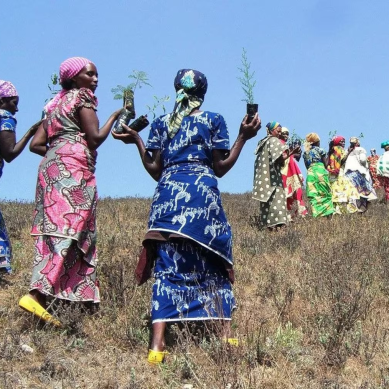
If someone were to put me on the spot and ask me to name an environmentalist group, I’d probably blurt out the first thing that comes to mind, Greenpeace. There are obvious reasons for this: Greenpeace has been around for more than 50 years, and it has done a masterful job of bringing environmental concerns to the world’s attention and keeping them there.
The group has a strong track record when it comes to advocacy and awareness, and it has a global reach. It’s truly one of the most visible non-governmental organisations (NGOs) in the world.
And that’s why I see it as significant that Greenpeace’s African division has come out swinging for a major new oil pipeline slated for construction in Uganda and Tanzania. Let me explain what I mean.
On April 14, Greenpeace issued a statement expressing dismay about the signing of a new agreement on the East Africa Crude Oil Pipeline (EACOP), a midstream project involving Uganda, Tanzania, the French major Total, and China National Offshore Oil Corporation (CNOOC).
The agreement serves to remove one of the final obstacles to the building of the pipeline, which will transport crude oil from fields in western Uganda, near Lake Albert, to a port on the Tanzanian coast. As such, it also clears the way for Total and CNOOC to set a concrete schedule for development of the upstream assets that will fill the line — and for investors to start pumping more than $5 billion into East Africa.
Greenpeace believes that Uganda and Tanzania ought to turn down this foreign direct investment (FDI). They explained their position by pointing out that EACOP poses environmental risks – which is hardly surprising, given their record on all seven continents. But they also argued that there were hard economic and political reasons to ditch the pipeline. Specifically, Greenpeace asserted that the building of the pipeline would have the following negative effects:
First, you’re wrong to predict that renewables will be crowded out if an oil pipeline is built. That’s not true.
EACOP is an export-oriented project, in that it’s designed to pump 216,000 barrels per day (bpd) of oil, or about 83 per cent of peak output from Uganda’s Kingfisher and Tilenga fields, to the Tanzanian coast so that it can be loaded onto tankers and sold on the world market.
In other words, most of Uganda’s oil won’t be going to refineries so that it can be processed into fuel for local power plants.
As a result, EACOP won’t help Uganda or Tanzania overcome their domestic energy deficits, which are considerable. These two countries will still need more electricity to support industrialisation initiatives and improve citizens’ quality of life after the pipeline is built. They’ll still need power plants – and they should try to meet that need by building solar farms, wind parks, and hydroelectric dams.
I happen to think they should also build natural gas-fired thermal power plants (TPPs), which boast lower emissions than facilities that burn petroleum products, but my point is: There’s nothing about building an oil pipeline that takes renewable energy off the table. (In fact, small-scale, locally-oriented renewable facilities may also have the advantage of not being subject to the deficiencies of East Africa’s transmission networks.)
So it’s wrong to describe this as an “either-or” situation, in which a binary choice must be made. It’s a “both-and” situation. Tanzania and Uganda stand to benefit from pursuing both renewables and an oil pipeline. Let’s not stand in their way by framing the matter incorrectly.
Second, you’re wrong to conclude that EACOP overlooks the interests of Ugandan and Tanzanian citizens and the communities along the pipeline route.
Yes, Total and other corporations involved stand to benefit from this project. (If they didn’t, they’d never agree to pump billions of dollars into it, and they might have a hard time convincing reputable service provider to sign contracts.) Greenpeace has never invested in any country and has never created a job. Okay they create a few jobs for drivers of the western aid workers in Africa.
But Uganda and Tanzania will benefit, too from Total’s investment. These two countries will earn revenues from oil flows through the pipeline and from oil sales. (Uganda alone may bring in as much as $2 billion per annum over a period of at least 20 years.) Their governments will collect taxes from the local contractors that see their income rise as a result of their involvement in the project.
Their businesses will profit from dealings with Total and CNOOC, which will have to hire local contractors in order to comply with local-content regulations and uphold their own contractual commitments. Their people will reap the rewards of the social welfare and infrastructure development projects these companies plan to carry out. Their societies as a whole will benefit from the construction of new infrastructure facilities such as roads, airports, hotels, and communications networks.
What’s more, ordinary Ugandans and Tanzanians will have a better chance of finding work once Total starts building the pipeline, for this project promises to create jobs — tens of thousands of them, and perhaps more than 100,000 of them overall. Samia Suluhu Hassan, the president of Tanzania, said on April 11 that she expected EACOP to create at least 10,000 jobs.
Mary Goretti Kitutu, the energy minister of Uganda, went into more detail, saying on the same day that she expected around 14,000 men and women to be hired directly by Total and CNOOC. About 57 per cent of these people will be local workers, she added.
She also stated that the upstream and midstream projects were likely to create many more jobs indirectly, with contractors to Total and CNOOC hiring around 45,000 people and businesses in other sectors taking on perhaps another 105,000 employees to handle the extra activity arising from oil operations.
- A Tell opinion/NJ Ayuk











